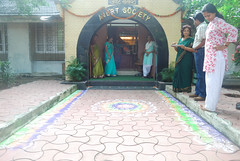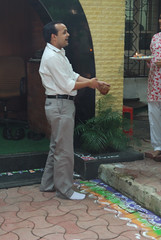 India is a land of festivals. It has so much religions: Hindu, Muslim, Roman Catholik, Sikkhs, Buddhists. Every religion have their own holiday. Last monday was for example Eid, the new year of the muslims.
India is a land of festivals. It has so much religions: Hindu, Muslim, Roman Catholik, Sikkhs, Buddhists. Every religion have their own holiday. Last monday was for example Eid, the new year of the muslims.
The current festival that already began last week is the Navratri. It lasts nine nights and would end at Monday, which is for this reason a public holiday. The festival is one of the most important festivals in the Hindu religion. It is dedicated to the godess Shakti and her nine forms.
Because today is the last workday of the festival, at about 17:00, shortly before the work ends, there is a small ceremony before the Avert Society building. The employees of the Society had made painting on the entrance way of the building. All employees gathered before the building. Dr. Rao, the Deputy Program Director, the highest officer in house at the moment, lit a lamp, ignited joss sticks and broke a coconut at the doorway. After that the coconut was devided and eaten by all employees.
There after Mr. Narayan gave us a short introduction into the Hindu philosophy. Through Buddhism the Indian religions has a very big influence in China. Concepts like Karma, Reincarnation are wellknown in China.
The Hindu religion is also very unique in all the religion because it has 3.3 million gods and godesses but also believe that all these gods and godesses are different aspects and incarnations of the one god.
 Indien ist ein Land der Feiertage. Es gibt so viele Religionen: Hindu, Muslim, Römisch Katholische Kirche, Sikkhs, Buddhismus. Jede Religion hat ihre eigene Feiertage. Letzter Montag war zum Beispiel Ramadanfest, das islamische Neujahr.
Indien ist ein Land der Feiertage. Es gibt so viele Religionen: Hindu, Muslim, Römisch Katholische Kirche, Sikkhs, Buddhismus. Jede Religion hat ihre eigene Feiertage. Letzter Montag war zum Beispiel Ramadanfest, das islamische Neujahr.
Die momentane Festtage, die bereits letzte Woche begann, ist Navratri. Es dauert neuen Nächte und würde am Montag enden, deswegen ist Montag ein öffentlicher Feiertag. Es ist eine der wichtigsten Festtagen der Hindu-Religion. Es ist der Göttin Shakti und ihrer neun Formen geweiht.
Da heute der letzte Arbeitstag der Festtagen ist, wurde um 17:00, kurz vor dem Feierabend, eine kleine Zeremonie vor dem Avert Society Gebäude abgehalten. Die Angestellten der Society hatten vor dem Eingang des Gebäuden auf dem Boden festliche Symbole gemalt. Alle Angestellte haben sich vor dem Gebäuden versammelt, Dr. Rao, der stellvertretender Program Director, der momentan höchste im Haus befindliche Amtsträger, entzündete eine Lampe und Räucherstäbchen und brach ein Kokosnuss vor der Tür. Später wurde das Kokosnuss aufgeteilt und an den Angestellten verteilt.
Danach gab Mr. Narayan uns eine kurze Einführung in die Hindu Philosophie. Durch Buddhismus haben die indischen Religionen großen Einfluss auf China. Konzepten wie Karma, Reinkarnation sind in China verbreitet.
Die Hindu-Religion ist auch sehr einzigartig, in dem sie 3,3 Millionen Göttern und Göttinen kennt, aber auch daran glaubt, dass alle diese Götter und Göttinen unterschiedlichen Ausprägungen und Inkarnationen des einen Gottes sind.
 印度是一个节日之国。这里有这么多宗教: 印度教、伊斯兰教、罗马天主教、锡克教、佛教。每个宗教都有其自己的节日。比如上周一是开斋节,伊斯兰教的新年。
印度是一个节日之国。这里有这么多宗教: 印度教、伊斯兰教、罗马天主教、锡克教、佛教。每个宗教都有其自己的节日。比如上周一是开斋节,伊斯兰教的新年。
目前正在进行的节日是Navratri。它共有九夜长,下周一结束,因此下周一是公共假日。它是印度教最重要的节日之一,是奉献给女神性力及其九个化生的。
因为今天是节日的最后一个工作日。在下班前约17:00在Avert Society办公楼前举行了一个小小的仪式。Society的工作人员在门前的路上画了吉祥的画。副业务指导Rao博士作为当时在场的最高领导人点燃一盏灯,焚香,在门口打开一只椰子。 后来椰子被分给职工吃。
此后Narayan先生给我们简介印度教哲学。通过佛教印度的宗教对中国有很大的影响。业、轮回等概念在中国很普及。
印度教有一个很特殊的地方。它有330万个神,但是也相信所有这些神都是一个神的不同方面和转世。

No comments:
Post a Comment